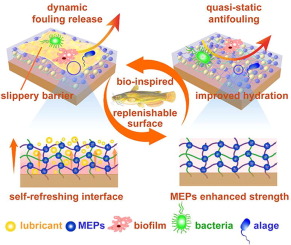Abstract
Biofouling is an exasperating problem in medical engineering and marine equipment fields resulting in great economic losses and adverse effect. In marine protection, quasi-static and dynamic antifouling techniques are the mainstreams of protection strategies for the long-term application. Inspired by the aquatic biology skins, a series of interpenetrating polymer networks (IPNs) equipped with autocrine property were developed by free radical polymerization, which contained zwitterionic nanoparticles and lubricant. These two components leaded to quasi-static antifouling and dynamic fouling releases characters guaranteeing their broad-spectrum application. Their mechanical properties, surface morphology, and the self-leakage behavior of lubricant were inspected using an electrical universal material testing machine, an optical microscope and SEM. The protein adsorption and algae adhesion to IPNs were also tested. The results indicated that the zwitterion modified nanoparticles not only promoted the mechanical properties of IPNs, but also improved their static antifouling properties with above 95% fouling resistance efficiency. Meanwhile, a good fouling release ability (above 60%-80% fouling release efficiency) and prominent self-renewal character of IPNs interface were obtained because of the embedded lubricant component, which indicated a weak interfacial adhesion for biomass. It is expected that the polymer networks combining quasi-static and dynamic antifouling property will be translated into marine antifouling applications due to the simplicity of preparation and superior antifouling capacity.
Biofouling is an exasperating problem in medical engineering and marine equipment fields resulting in great economic losses and adverse effect. In marine protection, quasi-static and dynamic antifouling techniques are the mainstreams of protection strategies for the long-term application. Inspired by the aquatic biology skins, a series of interpenetrating polymer networks (IPNs) equipped with autocrine property were developed by free radical polymerization, which contained zwitterionic nanoparticles and lubricant. These two components leaded to quasi-static antifouling and dynamic fouling releases characters guaranteeing their broad-spectrum application. Their mechanical properties, surface morphology, and the self-leakage behavior of lubricant were inspected using an electrical universal material testing machine, an optical microscope and SEM. The protein adsorption and algae adhesion to IPNs were also tested. The results indicated that the zwitterion modified nanoparticles not only promoted the mechanical properties of IPNs, but also improved their static antifouling properties with above 95% fouling resistance efficiency. Meanwhile, a good fouling release ability (above 60%-80% fouling release efficiency) and prominent self-renewal character of IPNs interface were obtained because of the embedded lubricant component, which indicated a weak interfacial adhesion for biomass. It is expected that the polymer networks combining quasi-static and dynamic antifouling property will be translated into marine antifouling applications due to the simplicity of preparation and superior antifouling capacity.

Keywords Plus:RELEASE PERFORMANCECLICK REACTIONCOATINGSHYDROGELMEMBRANESSURFACES
Published in CHEMICAL ENGINEERING JOURNAL,Volume 429;10.1016/j.cej.2021.132300,FEB 1 2022


